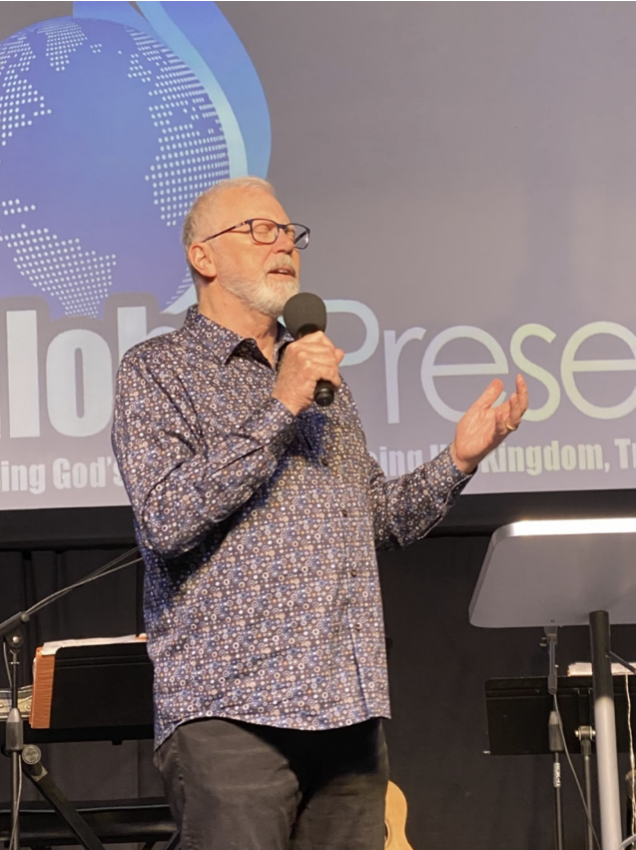Lifestyle
BRIAN W. SIMMONS – TRANSLATING GOD’S MESSAGE FOR THE MODERN READERS

No teaching is more important than the message of God. It discloses the mysteries and spreads the answers to the secrets. God’s words are not only dedicated to the preachers and ministers. In fact, it is a universal message that communicates to the entire humankind. God has created a path leading to inner satisfaction, success, and most importantly, heaven doors. Those who fulfill God’s commands aim to enjoy a happy life and will enjoy rewards after death. In order to receive enlightenment, the followers aim to understand God’s message and implement it in their life. God created this entire universe and set some defined rules to live nicely in this mortal world. These rules enable humans to adopt life ethics; no cheating, killing, helping others, and much more. God loves his creatures and wants people to love their fellows. So, He spreads the message of love and kindness. However, the modern generation needs the English translation of God’s message, which communicates the word-to-word translation and depicts the message’s core essence. Every individual of today’s generation deserves a Bible that brings God’s saving truths to life for the modern world. The simple translation of God’s word might deliver the true meanings of ancient texts. However, the modern generation needs a Bible that speaks today’s English, which is the right guide for people of all ages. People need to understand God’s message from an easy-to-read and easy-to-understand source. Some people aim to preach God’s message through easy translation that speaks the true essence of God’s message. There are passionate followers and lovers of God who want to deliver God’s message to unreached people. One such individual is Brian W. Simmons – a passionate God lover and Bible translator.
The Bible is one of the oldest books of all time, which is much more than just a book. People believe that the Bible is a message of God – something that every individual should read, understand, and implement in day-to-day life. A Bible should be in a language that directly speaks to people’s hearts. People who receive God’s message in their language tend to change their lives in extraordinary ways. People discover the mission of life when they truly understand God’s teachings, helping them to create a strong relationship with God. Therefore, people like Brian Simmons exist who bring Bible to today’s generation through the easy and true essence of translation. Their core objective is to deliver the message of God, which is understandable to common people. A proper Bible translation spreads awareness in the people of what God wants to say and how life can be beautiful by following His message.
Born on May 28, 1951, Brian W. Simmons is an American Bible translator, author, minister, and itinerant speaker. He is well-known as a lead translator of The Passion Translation and author of multiple books, devotionals, commentaries, and study materials. Dr. Simmons is a passionate lover of God who converted substantially to Christ in 1971, which motivated him to stay on God’s path and spread His message to today’s generation.
Brian was born in Eureka, Kansas, and later went to Colorado, where he earned his Doctorate of Practical Ministry from Wagner University. Although he became a victim of drug addiction in his early years, he bounced back from such a situation after a dramatic conversion to Christ. He has been married to Candice for over fifty years. After accepting Christianity, Brian and his wife answered the call of God and left everything behind to engage in the work of God. They both decided to deliver the message of God and became missionaries to unreached people. Brian has the title of one of the pioneers in ministry, along with his wife. His teachings, translations of the Bible, and numerous books have opened doors to bring the awakening message of God and revival for many. Brian and Candice Simmons have three children, six grandchildren, and three great-grandchildren.
After answering the call of God, the couple moved to the rainforest of Central America along with their three children, where they planted various ministries, including a dynamic church in Connecticut. Brian also established Passion & Fire Ministries, and they traveled as Bible teachers in local churches worldwide. In addition, Brian Simmons has authored numerous books, devotionals, and Bible studies that deliver the true essence of God’s message. The books include 365 Daily Devotions, The Image Maker, The Sacred Journey, I Hear His Whisper: Encounter God’s Heart for You, Prayers on Fire: 365 Days Praying the Psalms, and The Wilderness: Where Miracles Are Born.
Lifestyle
The Breakroom Reset: Small Changes That Improve the Workday

The office breakroom is a space that’s often neglected and can sometimes feel more like an afterthought than a key feature of the workplace. This is unfortunate, especially since employees typically visit the breakroom to rest and recuperate before finishing their shift. Considering its intended function, the breakroom should be viewed as one of the most important spaces in the entire office.
Having a welcoming and rejuvenating breakroom can promote social interaction, enhance workplace culture, and reduce stress. Employees who feel restored after visiting the breakroom are more likely to feel happy at work and be more productive the rest of the day. If your workplace breakroom leaves a lot to be desired, here are some small changes you can make to totally reset it.
Small Breakroom Changes That Improve the Workday
Unless your breakroom is in shambles and needs major reconstruction, you don’t have to spend a fortune on it to make it more inviting. In many cases, small and simple changes can make a big impact on the overall vibe of any space.
Whether you’re working with a limited budget or limited space, there are still plenty of things you can do to reset your boring breakroom. Here are some small breakroom changes that can improve the workday and give you maximum bang for your buck.
Convenient Hydration Options
Employees need to stay hydrated to keep their health and energy levels high. Unfortunately, many employees are chronically dehydrated because they don’t have access to tasty beverages at work. This doesn’t necessarily mean you have to install a soda machine in the breakroom. Giving workers unlimited access to sugary drinks could backfire in the long run by contributing to illnesses and increased sick days.
Instead of offering sugary beverages (that can actually contribute to dehydration in the long run), make it easier for your employees to stay hydrated with pure water. Providing a filtered office drinking water system is one of the best ways to encourage optimal hydration. Most employees will appreciate the clean, tasty alternative to standard office tap water.
Comfy Seating
When was the last time you took a look at the seating arrangements in your breakroom? If it’s been a while, take a walk over there and give it a good look. Is there sufficient space for multiple employees to sit at the same time? Are the seats comfortable and rearrangeable so employees can interact with others or achieve greater privacy as desired? If not, you might benefit from a breakroom seating reset.
Seating arrangements in breakrooms should be both comfortable and flexible. You might want to bring in some modular furniture because it’s easy to move and rearrange as needed. For maximum versatility, seating arrangements should include a mix of traditional breakroom chairs and tables, lounge chairs, and even bean bags. Making the space as open as possible will also help it look more roomy and inviting.
Nutritious Snack Options
Most employers don’t provide full meals for their employees. It’s perfectly reasonable to expect workers to make their own lunch or dinner arrangements. However, if you want to support your employees’ energy levels, keep healthy snacks in your breakroom. Nutritious snacks can enhance employee performance throughout the day, so workers find it easier to get more done.
Instead of investing in chips, candy bars, and other sugary sweets, opt for snack options that won’t cause sugar spikes and inevitable crashes. Some great options include trail mixes, protein bars, fresh fruit, popcorn, and veggie trays. Instant oatmeal cups can also be a convenient source of energy for those who don’t have time to grab breakfast before heading to work. You might want to send out an employee survey to see what types of healthy snacks your workers prefer.
Optimal Lighting
Did you know that poor lighting can negatively impact your employees’ psychological and emotional well-being? Improving workplace lighting (including in the breakroom) can make a huge difference in worker morale and energy levels. Warm white light may be a great choice for the breakroom because it creates a soothing, calm atmosphere. Cool white light might be a better fit for conference rooms and cubicle areas because it enhances focus and energy.
Of course, natural light is arguably the best option for the office whenever it’s available. If your breakroom has windows, try to keep the shades open during working hours. That way, employees can experience the mood- and health-boosting benefits of natural light exposure.
Entertainment Options
Some office managers and CEOs mistakenly think that a breakroom should be boring to serve its purpose well. However, the terms “boring” and “relaxing” are not synonymous. Employees may find a boring breakroom to be surprisingly non-restorative. On the flip side, a room equipped for entertainment can be very relaxing and rejuvenating.
To make your breakroom a more enjoyable place to spend time, you might want to install a corner television. That way, workers can watch their favorite sitcom while they relax. You might also keep a few card or board games stocked in a cupboard for employees who prefer to interact in fun ways during their lunch breaks.
Reset Your Breakroom Today
Your employee breakroom can reveal a lot about your overall workplace environment. If it’s not lit well, or if it’s boring and unwelcoming, workers are more likely to feel underappreciated and discontented. The good news is that you don’t have to sink a lot of money or effort into resetting your breakroom and getting a fresh start. Use these simple tips to revamp your breakroom and make it a place where workers can go to feel truly cared for and relaxed.
-

 Tech5 years ago
Tech5 years agoEffuel Reviews (2021) – Effuel ECO OBD2 Saves Fuel, and Reduce Gas Cost? Effuel Customer Reviews
-

 Tech6 years ago
Tech6 years agoBosch Power Tools India Launches ‘Cordless Matlab Bosch’ Campaign to Demonstrate the Power of Cordless
-

 Lifestyle7 years ago
Lifestyle7 years agoCatholic Cases App brings Church’s Moral Teachings to Androids and iPhones
-

 Lifestyle5 years ago
Lifestyle5 years agoEast Side Hype x Billionaire Boys Club. Hottest New Streetwear Releases in Utah.
-

 Tech7 years ago
Tech7 years agoCloud Buyers & Investors to Profit in the Future
-

 Lifestyle5 years ago
Lifestyle5 years agoThe Midas of Cosmetic Dermatology: Dr. Simon Ourian
-

 Health7 years ago
Health7 years agoCBDistillery Review: Is it a scam?
-

 Entertainment7 years ago
Entertainment7 years agoAvengers Endgame now Available on 123Movies for Download & Streaming for Free
